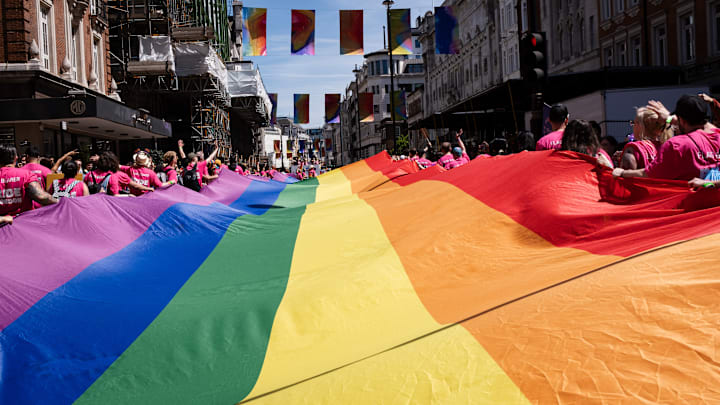I've recently been enjoying a phenomenon on Threads. Any time someone posted a certain phrase be it "Happy Pride" or "Love is Love," a like on that post would result in a visual explosion of rainbow confetti I enjoyed how celebrated Pride Month has been as I read about people coming out to their families or marching in their first parade or finalizing an adoption with their partner. Something that I read frequently in the last few days was, "Who wishes that the confetti was a permanent thing so we could celebrate Pride Month all year round?"
I am an ally, but also someone who falls under the A of LGBTQIA because of being asexual. I am fortunate to know many people in the queer communities and I would love to keep Pride going in a way. With that in mind, I asked some of them for recommendations of books about the queer experience that they'd recommend reading. Thanks to them for giving me so many suggestions that I could easily write ten of these articles. In fact, this will not be the last of these articles for that reason.
1. OUT in All Directions: The Almanac of Gay and Lesbian America
This fully illustrated book edited by Lynn Witt, Sherry Thomas, and Eric Marcus is exactly what it says. Published in 1995, it includes information on many aspects of the culture. If you're looking for history or information on the gay rights movement, there is information for you there. There is a "glossary of gay concepts" as well as thoughts on movies.
2. And Tango Makes Three
As with many books on LGBTQIA experiences, this book by Peter Parnell and Justin Richardson is the subject of much debate. According to the American Library Association's Office for Intellectual Freedom, it is on the list of Top 100 Banned or Challenged Books: 2000-2009, though it appears on that list again for 2010-2019. The book illustrated by Henry Cole depicts the true story of male penguins Roy and Silo, who help hatch an egg with the help of the zookeeper Mr. Gramsay. The touching story depicts these chinstrap penguins who pair bond with each other and even create a nest for their family and then care for an egg from another penguin's clutch until it hatches. Baby Tango is celebrated by penguins and humans alike and it ends with a reminder that happy families can look different.
3. Gender Queer
One of my passions is my volunteer work with the Trevor Project and something we often say is that it is normal and understandable to explore your identity and orientation. Maia Kobabe affirms this in eir award-winning memoir about navigating adolescence as a non-binary and asexual person. Readers may not share the experience but can remember their own experiences with crushes, self-discovery, and what brings friends together. Maia begins the story by recounting a graduate school assignment on autobiography and how writing down a list of personal "demons" about gender expression was so embarrassing that the pages were covered in eir notebooks. In one panel, e peels back one of the covers to reveal the title of the book. It's an excellent explanation of formative experiences through perspectives of expected gender roles and is wonderfully approachable.
4. Let the Record Show: A Political History of ACT UP New York, 1987-1993
This recommendation caught my eye because I am a fan of RENT. During "La Vie Boheme," Angel celebrates Collins' sabotage of MIT virtual reality equipment to broadcast the words, "Actual reality. ACT UP! Fight AIDS!" The middle phrase refers to a movement in New York that attracted people of many backgrounds, genders, sexualities, etc. This book has too many awards to list here, but it draws on more than 200 interviews with activists who participated in the movement. This is the rich history of efforts to clear the way for AIDS treatment, start needle exchange programs, and fight bigotry to help the people abandoned by society. As Paul Sehgal said in The New York Times, "This is not reverent, definitive history. This is a tactician's bible."
5 This Is A Book For Parents of Gay Kids
The audience is clear in this book by Dan Owens-Reid and Kristin Russo, but it is not exclusive. Many people are looking for ways to support LGBTQIA individuals and communities beyond the parental roles and this can help with that as well. It's a Q&A format that draws on the experiences of parents and children who have navigated the topics. It not only shares "own voices" narratives but talks parents through what their emotional responses might be and what their child is looking for in terms of support.
There are many more books that I could list, which is why there will be more to come on this subject, but on this last day of Pride Month, here is the first instalment of what to keep reading tomorrow.
